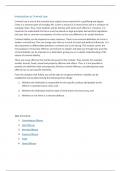Lecture notes
Criminal Law-COMPLETE MODULE(LLB Exam Plans, 1st Class)
- Module
- Criminal Law
- Institution
- University Of Oxford
These UK Criminal Law notes provide a comprehensive and in-depth analysis of all key topics covered in the syllabus, including Homicide, Non-fatal Offences, Theft, Criminal Damage, Inchoate Offences, and Defenses such as Insanity, Automatism, and Self-defense. With detailed explanations, case...
[Show more]



